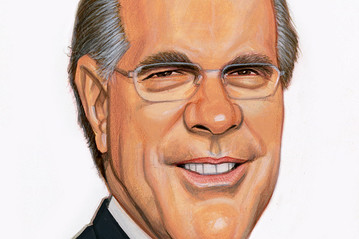China Warns U.S. About Debt Monetization

Seemingly everywhere he went on a recent tour of China, Dallas Fed President Richard Fisher was asked to deliver a message to Federal Reserve Chairman Ben Bernanke: 'stop creating credit out of thin air to purchase U.S. Treasuries.' The Chinese are rightfully worried that B-52's plan for all the newly-created U.S. sovereign debt is monetization through Treasury purchases, otherwise known as quantitative easing (which is failing by the way).
China is talking more cautiously, yet still is long schizophrenia as the newest evidence shows they remain buyers of US government debt at a steady clip, though they have shifted their risk appetite to shorter-maturity paper. Is that a fear of U.S. hyper-inflation a few years hence?
The most important story of the long weekend and short week is the WSJ account and interview with Dallas Fed President Richard Fisher (call him Mr. $99 trillion in unfunded liabilities, if you will). He's the inflation hawk on the Fed board and claims to see none percolating yet.
He also reveals that he voted against the plan for quantitative easing (using money <credit> created from nothing in order to purchase U.S. government debt and thereby move interest rates lower). It is the only monetary option remaining to governments who have already pushed interest rates to zero. And as B-52 will tell you, it doesn't always work, at least for longer than 60 days. Not when the market sees $10 trillion in new debt issuance coming down the pike.
Outstanding WSJ piece (free link) is after the jump.
WSJ:
"I think the trick here is to assist the functioning of the private markets without signaling in any way, shape or form that the Federal Reserve will be party to monetizing fiscal largess, deficits or the stimulus program."
The very fact that a Fed regional bank president has to raise this issue is not very comforting. It conjures up images of Argentina. And as Mr. Fisher explains, he's not the only one worrying about it. He has just returned from a trip to China, where "senior officials of the Chinese government grill[ed] me about whether or not we are going to monetize the actions of our legislature." He adds, "I must have been asked about that a hundred times in China."
In a speech at the Kennedy School of Government in February, he wrung his hands about "the very deep hole [our political leaders] have dug in incurring unfunded liabilities of retirement and health-care obligations" that "we at the Dallas Fed believe total over $99 trillion." In March, he is believed to have vociferously objected in closed-door FOMC meetings to the proposal to buy U.S. Treasury bonds. So with long-term Treasury yields moving up sharply despite Fed intentions to bring down mortgage rates, I've flown to Dallas to see what he's thinking now.
It's an outstanding article. Read the whole thing here. And a reaction from always interesting Ambrose Evans-Pritchard here.

 May 29, 2009 at 2:45 AM
May 29, 2009 at 2:45 AM
Reader Comments (10)
http://www.nakedcapitalism.com/2009/05/guest-post-marc-faber-says-i-am-100.html
The disciplinarians of U.S. policy makers return.
http://online.wsj.com/article/SB124347148949660783.html
Mr. Market has called Bernanke's bluff, but what will he do now? Fire up the popcorn, honey, this could get real interesting real quick.
Why bailouts are always doomed to fail:
http://www.amazon.com/gp/mpd/permalink/m316LOQ5EYQ8E7
Did Lehman need to be saved?:
http://www.amazon.com/gp/mpd/permalink/m2ZEJERXNJAAHA
http://www.youtube.com/watch?v=c1wEqBu54gM&feature=channel_page
"A major goal of Geithner's maiden visit to China as Treasury chief is to allay concerns that Washington's bulging budget deficit and ultra-loose monetary policy will fan inflation, undermining both the dollar and U.S. bonds.
...
"Chinese assets are very safe," Geithner said in response to a question after a speech at Peking University....
His answer drew loud laughter from his student audience, reflecting skepticism in China about the wisdom of a developing country accumulating a vast stockpile of foreign reserves...."
http://news.yahoo.com/s/nm/20090601/ts_nm/us_usa_china_5
"Hmmm... this is interesting.
91 day bill offering:
Bid-to-cover 3.69, Indirect was ~51% of the total (eek!)
182 day bill offering:
Bid to cover 3.22, Indirect was 46%.
This tells me the following:
-The shorter the offering, the more interest. That's not so good.
-The shorter the offering the more indirect (foreign) interest, and foreign interest is abnormally high.
Thus:
1. Foreigners (e.g. China) are shortening duration. This is very bad for the longer end of the curve. We could see DRAMATIC evidence of this next week, which would confirm the warning that the bond market has been flashing since Bernanke's QE announcement.
2. People are willing to take damn near nothing for 26 week (basically half year) bills - 0.29% and half that (0.15%) for the 13 week."
http://market-ticker.denninger.net/archives/1078-Short-End-Debt-Offerings.html
I'm sure someone like Turbo (or his homeboy Steve Liesman) could spin this differently, but this looks like part of an exit strategy to me. This also means that Treasury will have to roll this debt over very soon. If I were Chinese I guess I'd be laughing at our Treasury Secretary, too. (Not that one has to be Chinese, but I'm just sayin'...)